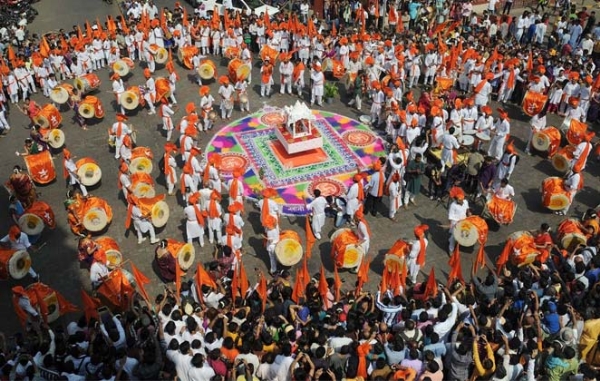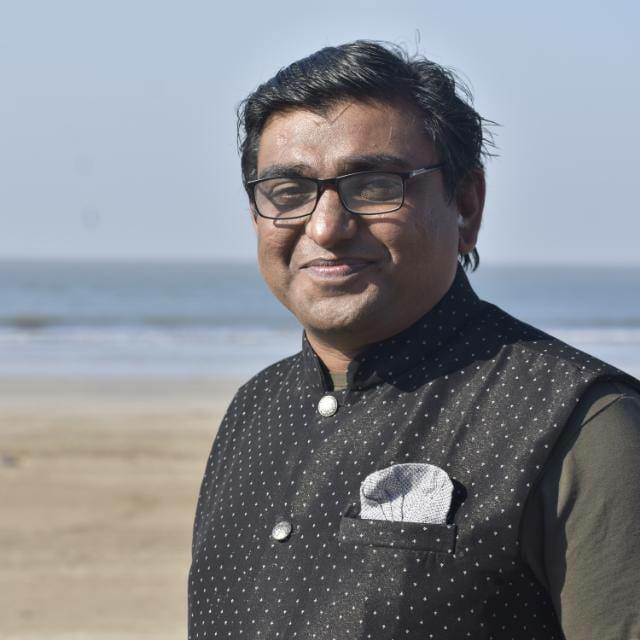Hindu New Year celebration & India's socio-economic well-being: A Researched Commentary
Hindu New Year, rather than January 1st, has some significance in terms of what is happening on the planet and in the human physiology and mind on this day.
Total Views |
Swami Vivekananda, the sage of national consciousness, had said - If we have to awaken the spirit of living with pride, if we want to make the seed of patriotism flourish in our hearts, then we will have to take shelter of Hindu national calendar dates. Whoever relies on the dates of strangers becomes a slave and loses self-esteem.

Every year in the month of Chaitra, Hindus celebrate Nav Varsh. The Hindu New Year is observed according to the Vikram Samvat calendar. The most important aspect of this calendar is that it calculates time scientifically and provides accurate and authentic information about various astronomical events. Every year on the first date of Chaitra month, which is the indicator of the new year in the country, the Hindu New Year is celebrated on a completely scientific basis. According to the Hindu calendar, the country also organises various festivals, rituals, fasts, and other programmes. Chaitra is a month of enthusiasm and beauty in nature, as well as the arrival of spring. On the occasion of Hindu New Year, the entire natural world appears to be ready to welcome the new year. The Hindu New Year is also regarded as a very holy day from a spiritual standpoint. The Hindu New Year is known as Gudi Padwa in Maharashtra, Goa and Konkan region, Ugadi in Andhra Pradesh, Telangana, Karnataka, Thapna in Marwar region of Rajasthan, Navareh in Jammu and Kashmir and Cheti Chand in Sindhi region.
We Indians are hesitant to make wishes on the day of Hindu New Year, perhaps because we fear being labelled as orthodox. While adhering to our culture and rituals does not constitute conservatism. This is a valuable heritage from which the entire world is learning and adapting the culture for socio-economic development, peace and prosperity, while we as Indians are losing this great heritage. The culture that showed the world the right and better way is now being forced to go astray. Even though we are spreading messages on social media today to celebrate Hindu New Year, we have forgotten the scientific, spiritual and socio-economic significance about it.
It is an irony that in our society, despite the pomp and gaiety with which foreign New Year is celebrated on January 1 in cities and metropolitan cities, not even a percent of its joy is visible on this auspicious festival. It is surprising that we are interested in blindly following other people's traditions while being unaware of our own. The Hindu New Year is not simply observed as part of a belief system or as a convenience; there is science behind it that improves human well-being in a variety of ways. Because other developed countries have moved ahead of us economically, the profundity of what this country has been is being dismissed today. The economic fall is because we have been exploited by Mughals and Westerners; however, the profundity of this culture was not created in a matter of years; it is the result of thousands of years of work and we will soon be economically strong again.
In Indian calculus, the most weight is placed on Vikram Samvat Panchang. Sanatan Dharma followers perform all auspicious functions such as marriage, naming, and housewarming according to Vikram Samvat only. Vikram Samvat began in 57 BC. It was named after Ujjain's King Vikramaditya. In Indian history, Vikramaditya is remembered as a just and popular king. Ujjain was ruled by the Shakas prior to the reign of Vikramaditya. They were cruel and always caused problems for the people. Vikramaditya liberated Ujjain from the harsh rule of Shakas, as well as his people from fear. It is clear that Vikram Samvat Panchang was constructed 2079 years ago in commemoration of Vikramaditya's victory.
Why is China today's socio economic powerhouse?
Neighboring China celebrates the New Year according to its own culture; the Chinese celebrate the New Year according to the lunar calendar. Lunar New Year is another name for Chinese New Year. Chinese New Year is one of China's most important holidays. Chinese leaders also congratulate people on this occasion.
Chinese New Year is also very important socially. This New Year reconciles Chinese people, removes all disputes and wishes everyone happiness and prosperity. On the next day of the new year, children congratulate their parents for the new year, parents give money to their children in red paper envelopes. This festival is the longest national holiday in China. About 30 crore migrant laborers go to their parents and villages with their savings to meet their children and celebrate the new year. Can we attribute a significant socioeconomic rise to adherence to their own culture rather than Western culture? When will we realise the importance of adhering to our own culture in order to achieve greater heights in all socioeconomic and spiritual aspects?
Spiritual and scientific significance of Hindu New year
Hindu New Year, rather than January 1st, has some significance in terms of what is happening on the planet and in the human physiology and mind on this day. The Hindu new year is based on the Lunisolar calendar, which is directly related to how the human body is built. The Indian calendar is significant not only culturally, but also scientifically, because it connects you to the planet's movements. The spring season begins with Pratipada, which is filled with joy, enthusiasm, and happiness, as well as the scent of flowers all around. This is also the time when the crop begins to ripen, allowing the farmer to reap the benefits of his labour. The Nakshatras are in a favourable position. That is, there is a favourable time to begin any work.
The northern hemisphere receives the majority of the Sun's energy during the 21-day period beginning with Hindu new year due to the tilt of the Earth. Though the high temperatures may be uncomfortable for humans, this is when the earth's batteries are charged. The first day of the waxing moon following the first new moon after the equinox marks the start of a new year.
Twelve Hindu mas (māsa, lunar month) are equal to approximately 354 days, while the length of a sidereal (solar) year is about 365 days. This creates a difference of about eleven days, which is offset every (29.53/10.63) = 2.71 years, or approximately every 32.5 months. Purushottam Maas or Adhik Maas is an extra month that is inserted to keep the lunar and solar calendars aligned. The twelve months are subdivided into six lunar seasons timed with the agriculture cycles, blooming of natural flowers, fall of leaves, and weather. To account for the mismatch between lunar and solar calendar, the Hindu scholars adopted intercalary months, where a particular month just repeated. The choice of this month was not random, but timed to sync back the two calendars to the cycle of agriculture and nature.
Chaitra Shukla Pratipada's historical significance:
It is stated that Brahmaji began the creation of the universe on this day at sunrise. On this day, Emperor Vikramaditya established the kingdom. The first day of Vikrami Samvat is named after him. This day is also considered as Lord Shri Ram's coronation day. The first day of Navratri, the nine days of power and devotion. It is the birthday of Shri Angad Dev Ji, the second Guru of the Sikhs. On this day, Swami Dayanand Saraswati ji founded Arya Samaj and delivered the Krivanto Vishvam Aaryam message. On this day, Bhagwan Jhulelal, the famous social protector Varunavatar of Sindh province, appeared. Shalivahan, like Vikramaditya, chose this day to defeat the Huns and established the best state in South India. Vikram Samvat was founded. This was also the day of Yudhishthira's coronation. Sangh founder P.P. Dr. Keshavrao Baliram Hedgewar's birthday happens to be on this auspicious day.
If the new year begins with alcohol and drug abuse, everyone must examine their inner selves. Only by commemorating Hindu New Year can the new year have any significance for human life and the environment.
--


